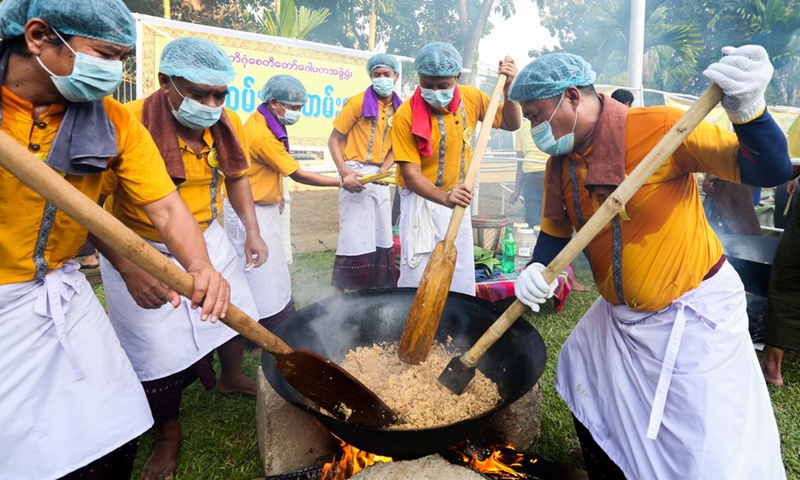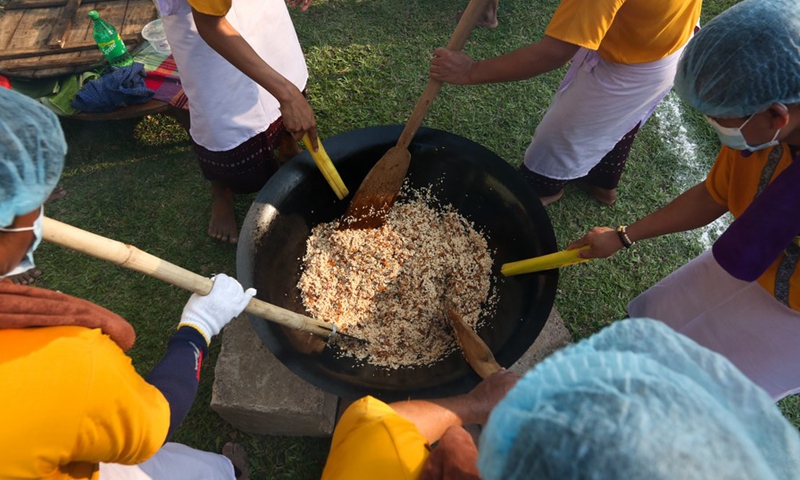
People participate in a traditional Htamane (sticky rice) making competition at the Shwedagon Pagoda in Yangon, Myanmar, Feb. 3, 2023.(Photo: Xinhua)

People participate in a traditional Htamane (sticky rice) making competition at the Shwedagon Pagoda in Yangon, Myanmar, Feb. 3, 2023.(Photo: Xinhua)
With traditional folk music troupes and fans, the traditional Htamane (sticky rice) making festival has returned to the compound of Myanmar's famous Shwedagon Pagoda after a two-year hiatus.
Win Tun, 45, said with a warm smile that he is happy to participate in the pagoda's 15th traditional Htamane Festival, or sticky rice festival.
"Now is the 13th time I have participated in the great pagoda's Htamane festival. I am taking part in the competition as I want to offer Htamane to the great pagoda and monks," he said.
A total of 24 six-member teams participated in the competition of the traditional festival this year.
The number of the teams competing to make the Htamane decreased this year compared to the years before the pandemic, as it is the first one since the outbreak of COVID-19 in Myanmar, he said, adding that about 36 teams participated in the last competition before the pandemic.
Win Tun said that they have also made and donated the Htamane food to the pilgrims at other pagodas and to the poor in previous years.
Myanmar's traditional Htamane food is prepared by first washing and then soaking white and purple sticky rice. The sticky rice is then kneaded, crushed, and boiled with water and ground nut oil in a giant, wide wok on a low stove until it becomes a thick blackish-grey paste.
Thousands of people across the Southeast Asian country have celebrated the Htamane festival, on the full moon day of Tabodwe, the 11th month of the Myanmar lunar calendar, which falls on Feb. 4 this year.
U Hla Thein, 58, a member of the Traditional Medicine Family Team, told Xinhua that the competition at the pagoda is very good for Myanmar people as it is the first celebration since the outbreak of the COVID-19 pandemic.
"It is Myanmar people's religious tradition. I'm happy to attend the competition," he said, adding that more events like this should be held in the future.
He said that his team has participated seven times in the Shwedagon Pagoda's annual sticky rice making competitions in the past years before the pandemic, and won prizes twice.
Yangon Region Chief Minister U Soe Thein also attended the event at the pagoda on Friday evening.
"The Htamane festival is a Buddhist tradition as well as Myanmar people's tradition," said U Htay Hlaing, a member of the pagoda's board of trustees.
The majority of people in Myanmar are Buddhists, and they are famous for doing charitable work. They agree that merit-making including charitable endeavors is an essential part of their lives.
To celebrate the traditional Htamane festival, many of the Htamane competitions were held across the country on Friday evening, and then the prepared foods were offered to monks and distributed to pilgrims and the poor as charity food on Saturday evening.
Some communally celebrated the festival at the pagodas and monasteries, while some others observed it privately at home.
"We got a foam box of traditional Htamane food from a neighbor this morning. I already ate it. It was very tasty," a Yangon resident told Xinhua on Saturday.
"The festival is a lovely tradition of Myanmar people," he said.
